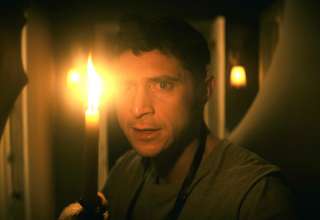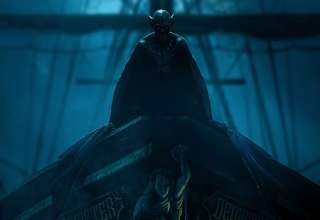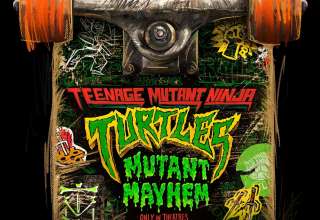It’s obvious that Detroit will certainly have an audience that can and will appreciate all of what’s being put on display. It’s also the kind of movie that will evoke a strong reaction from most of the people who care to watch it. That appears to be the primary goal for Kathryn Bigelow and Mark Boal these days as they continue to travel down the path that has seen them garner critical praise and award buzz for their last few movies together.
In search of something a little different in terms of story, they traveled to Detroit and dug further into the past to make a film about a case that very few have probably ever heard of. The date is July 25, 1967, and the vast majority of what goes down takes place in The Algiers Motel during the racially charged 12th Street Riot. The events of that night resulted in three civilian murders at the hands of police officers with an ending that’s all too predictable even in this day and age.
Although the story and location are different, the style is pretty much the same for the duo who have spent their last couple of movies in the desert, in war rooms and in the field. This feels like a modern day Kathryn Bigelow movie, so you probably shouldn’t be expecting anything different from that. Of course, they deal with more serious subjects, but it’s clear that like Marvel, Disney, etc., Bigelow and Boal have a formula that works for them that they have no desire to get away from at this time.
Detroit starts off with showing the audience how this particular riot came to be. This portion of the movie performs as a first act that is moving and captivating as it asks for and is able to hold your attention. It’s at this point where everything is moving fast as we’re being introduced to a number of characters and seeing the tensions rise as emotions boil over. During this time, I couldn’t help but wonder how much better Zero Dark Thirty would have been had it used this approach instead of solely relying on one unbelievable composite character to push the entire narrative.
The first act was a surprise in that sense because it was done so well and shot in a way that makes you feel as if you’re an observer who’s detached from it all while still seeming somewhat close to the action. This documentary style could have worked well for the whole movie, but they do manage to venture off into the stuff that they’re using to promote this to the masses. From here, the second and third acts take on a different tone and pace that may be somewhat off-putting to a few.
This isn’t to say that what’s seen in these two acts are of poor quality, but they’re delivered in a way that’s almost completely different from the first although there’s still kind of a detached feeling to much of it. As you watch the whole thing, you may notice that the final two acts almost feel like its own movie as it’s separated from just about everything we saw before them. I suppose that there was a better way to blend it all together, but that doesn’t happen and we’re left with a pacing issue that’s difficult to ignore.
Once we get into the second act, things slow down as we settle in at this one location. Many will see what’s here as gripping and powerful mainly due to the actions of the cops involved, but a person who is more emotionally subdued may not have the same response. As to be expected, some of what is seen here is exaggerated for cinematic purposes. They understandably want those strong reactions from you as you watch. Based on some feedback, both the real and dramatized features during this period worked well for plenty of people, so I think they’re going to reach that goal in many cases.
The second act is also where we meet almost all of the significant characters. We meet a handful of characters in the first, but only a couple of them are actually of any importance to the actual story the film is telling. Everyone else is introduced in the first act is completely forgotten about and rendered meaningless to the rest of the film.
The way this was handled is what I have a problem with here. We spend a decent amount of time being made familiar with a number of characters that don’t ultimately mean anything to the story. It’s weird for obvious reasons, but it’s also awkward since it led me to believe that we had a person who should have been the center of the film the entire time. He’s not really in any of the trailers I don’t believe and isn’t even really promoted as one of the main players.
I’m talking about Larry Reed, an aspiring singer played by Algee Smith. While Will Poulter might have the most screen time as a fictionalized version of the film’s real life antagonist, Smith is Detroit‘s spiritual lead and is the only person here with any real character arc. The person he plays could have easily been the focus of the movie from the start, but Bigelow and Boal chose to begin with this war footage approach that I actually liked quite a bit. Even though I did think what was done well, having his character be the center turns this into a movie instead of a series of events.
This is where the set up proves to work as a negative to some degree as that first act doesn’t allow us to attach to it like it should have. I wouldn’t have an issue with this had the rest of Detroit handled in the same fashion, but it doesn’t, so the transition is odd and is unable to mesh well with everything else. Those final two acts try to be more personal, so using Smith’s Reed as the film’s focus allows for us to travel down that path with him more and builds an overall connection.
In the end, Detroit achieves most of what it sets out to accomplish even though its structure prevents it from truly being a compelling piece of cinema. That and some questionable dialogue could have been improved upon easily in my mind. By doing that, we would have had a more centralized story of some traumatic events that are rarely ever handled correctly even in an era wear police sometimes have cameras on them from all directions. With all that being said, I doubt whoever sees it will regret giving it a chance.
Rating: R
Director: Kathryn Bigelow
Cast:
John Boyega
Will Poulter
Algee Smith
Jacob Latimore
Anthony Mackie
Jason Mitchell
John Krasinski
Kaitlyn Dever
Samira Wile
Film Length: 142 minutes
Release Date: August 4, 2017
Distributor: Annapurna Pictures
- Score - 6.5/106.5/10






















